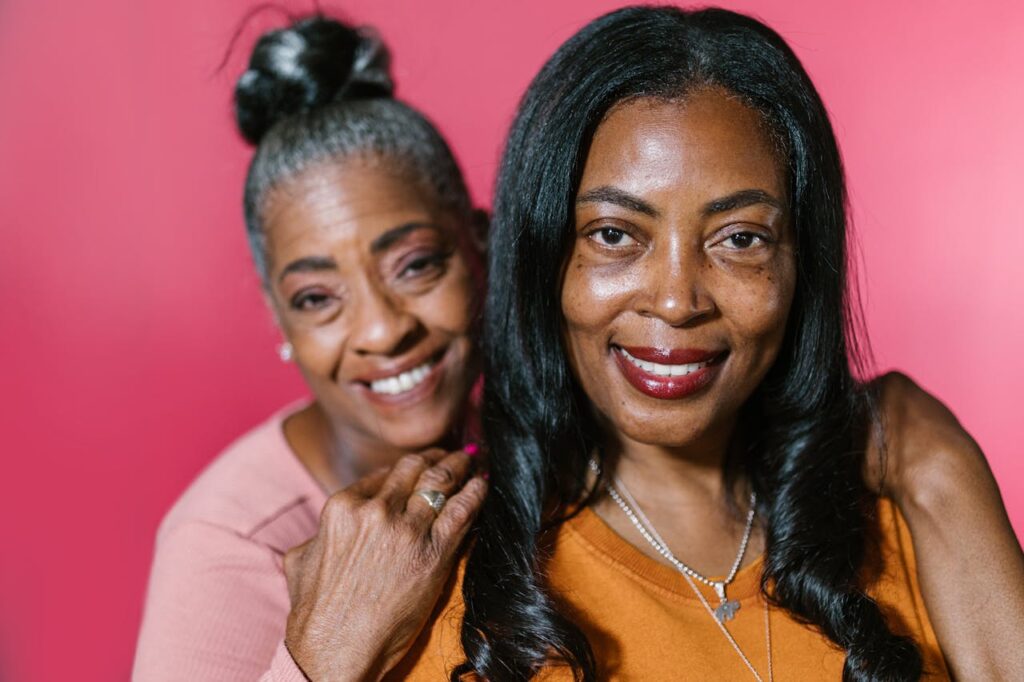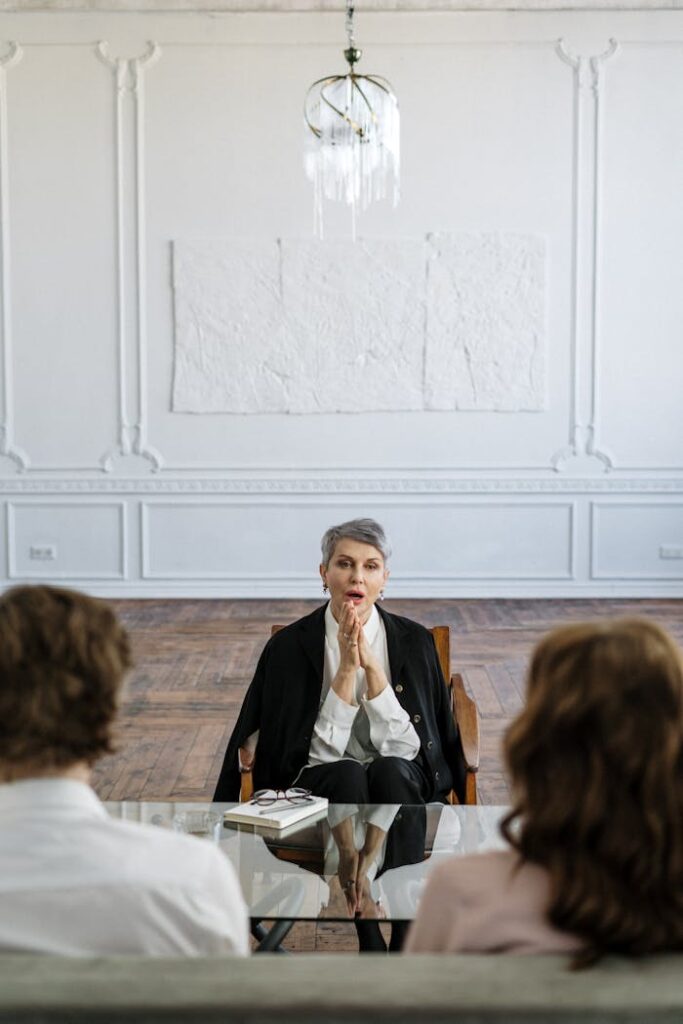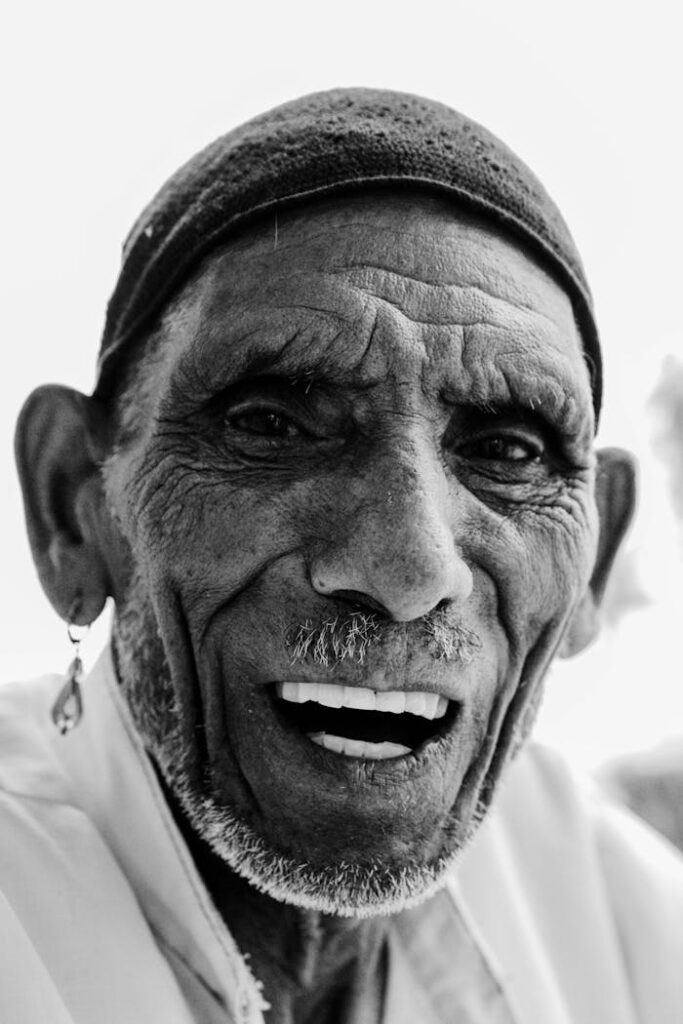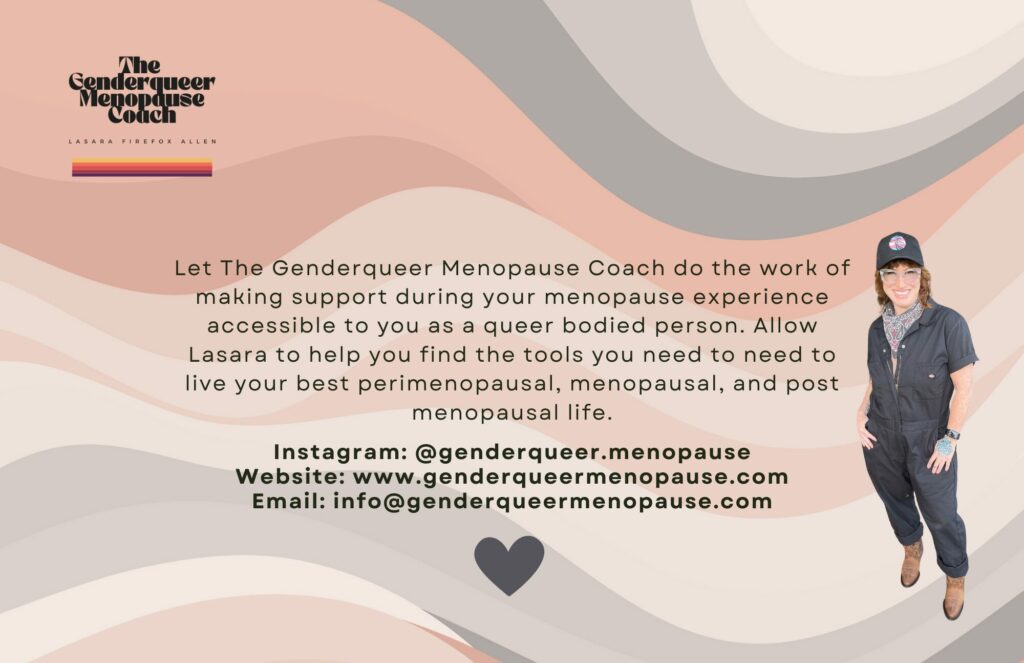
Menopause as gender affirmation has been a deep experience for me as a genderqueer individual and a Genderqueer Menopause Coach. As I find myself solidly postmenopausal, I feel the desire to share some notes on my experience of menopause as gender affirmation.
The reasons for this are clear: First, there’s not enough conversation about menopause. Secondly, with a few exceptions (like What Fresh Hell is This, and Queer Menopause), when conversation does happen, most of the discussion there is, comes from a binarist and extensively gendered (read “female”) frame. Third, having come fully into my nonbinary gender identity later in life, I was somewhat surprised at the gender affirmative qualities of my menopause experience myself, and wanted to share this perspective.
I have come to appreciate the unexpected ways in which the menopause transition can serve as a powerful affirmation of gender identity. Menopause offers a unique opportunity to redefine our relationship with our bodies, celebrate our true selves, and explore complex and diverse elements of gender affirmation. In this article, we will delve into the empowering aspects of menopause while acknowledging the challenges it can bring.
Liberation from the Menstrual Cycle
One of the most obvious and easy to grasp elements of the empowerment and affirmation of menopause is liberation from one’s menstrual cycle. For many trans and gender nonconforming (GNC) individuals, menstruation can be a distressing reminder of a body that does not align with their gender identity. The cessation of menstruation during menopause provides a welcome release from this regular and persistent reminder and allows for a deeper connection with one’s true self.
Throughout my life I had a terrible relationship with my menstrual cycle. I experienced exhausting and depleting cycles of bleeding, and mind-boggling monthly bouts of premenstrual syndrome (PMS). They were so intense, in fact, that they were diagnosed as premenstrual dysphoric disorder (PMDD) by my medical care providers. I experienced premenstrual migraines like clockwork.
Little did I know at the time, some of my menstrual experience was rooted in gender dysphoria.

Though I worked hard on owning my cycles–I did blood art, I free-bled, I bled into reusable cotton rags to take back my power from the corporations (and to reduce my exposure to chemicals), I tried menstrual cups (and hated the way they made my anatomy feel), I tried period underwear (and liked them ok), I meditated on the power of my procreative capacity–it still never felt as empowering as I would have liked to bleed, again and again, for so much of my life. All in all, the rush of hormones that hijacked my body never felt welcome.
For me, the cessation of my cycles was nothing short of awe-inspiring. It gave me a profound sense of owning my body for the first time since pre-menarche.
End to the Threat of Pregnancy
For those of us who are trans and/or GNC and have eggs, who have sex with those who produce sperm, the positive emotional impact of an end to the threat of pregnancy needs to be mentioned. I believe this is probably also a welcome event for many cis women too. I also know that many folx of any gender also fear, or experience sadness at, the end of their child-bearing years. As a highly fertile individual, for me it was an absolute joy to cross that threshold.
As an aside; one of the most mystifying parts of perimenopause for me was the unexpected, nearly audible, tick of my biological clock, and the resultant upswing in sexual desire. Thankfully it was not an easy proposition to become pregnant for me at that time, or I may have decided to, and may have had a little one running around as I write this article. I’m so thankful not to have given in to the weird biological urge even when the pull was so strong.
I have two grown kids. They’re both amazing young queers, and I know I have done my part to populate the queer world. I am thankful I was able to override my final push of procreative urge.

Reduction in Gender Dysphoria
The end of the intense rushes of “female” hormones and hijacking of my body through menstruation and pregnancy was gender affirming in a way that brought me more fully into my nonbinary gender identity than I had ever landed before. In some ways, one of the menopause-related fears of cis women–the “unsexing” of menopause–was my salvation.
For me, the move toward a less gendered body felt like a coming home. The increase in bodily agency, both internal and external, was unparalleled. The sense of relief was something that I didn’t even know I’d been waiting for. The reduction in societal expectations and pressures–for me to be, or behave in, certain ways–was palpable.
While this rubs up against another area of menopause-related fear for cis women, that of the invisibility factor of aging, for me there was a palpable calm that descended with the reduction of background noise of certain societal expectations.
Drop in Sex Drive
While this can also be experienced as a negative, there are positive sides to it in my experience as well. Up to menopause, much of my life and attention was dominated by sexual desire, sexual chemistry, and sexual impulse.
While I miss the high-level hum of sexual attraction and desire at times, having it rolled back to a background note is not overall the most awful thing ever. Feeling more in control of my sexual energy is not a negative, overall.
In my intimate relationships it has shifted things in ways that are not always easy; sex is more planned out, it takes more intention and care, it is an “occasion” instead of an automatic activity. This has taken adjustment for me and those I am intimate with. But it also matches the shifts occurring for others who are also at my age of sexual transition; yes, it’s more of a production, but it’s still just as satisfying.
Menopause is Not a Bowl of Cherries, But…
I acknowledge that it’s not an experience without its drawbacks. Anyone with a body that bleeds likely has fears about this stage of life. And to be sure, there are plenty of downsides to menopause: hair loss (on the head), hair growth (all over the body), muscle loss, lower energy, weight gain, increased joint pain, and the double-edged nature of the lower sex drive. However, many of us know a bit about those.
Most of us never talk about the positive impacts of menopause, and that’s a big part of what I want to bring to the conversation with this article: the positive potential of menopause from a genderqueer frame.
Bringing Menopause Out of the Closet

Open dialogue about our experiences is so important. Let’s continue discussing the positives, the negatives, and all the in-betweens of the queer experience of menopause. Open conversation is the best way to demystify this stage of life, and to be able to prepare and to adjust as the changes roll in. Open discussion gives us a chance to ask for and offer support from others who are weathering the same experience.
While menopause is coming out of the shadows, many still treat it as a taboo subject. The only thing that will shift this is our willingness to have these conversations. So reach out for support, engage in mutual education and information sharing, and lift the silences that pervades “the change.”
Note: The content of this article is intended for informational purposes only and should not be considered medical advice. It is important to consult with healthcare professionals–and your community–for personalized guidance and support during menopause.
Want support in your menopause journey? Schedule with me now for a free, brief, introductory queer-affirming menopause coaching conversation.
“I was so grateful for the opportunity to connect with Lasara through the menopause doula/ coaching session. My personal experience with surgical menopause due to a BRCA mutation was something of a horror story and I have struggled to find support within the medical resources I had access to. My session with Lasara not only provided validation for a queer body experiencing a multitude of symptoms and lack of understanding, but they connected me with resources and suggestions that helped me manage some of those symptoms and the knowledge that I am not alone. This session was one of the first times in the 3 year journey to hell and back that I felt heard and understood. Thank you, Lasara, for seeing me and supporting me.”
— Sandra, she/they, 49


